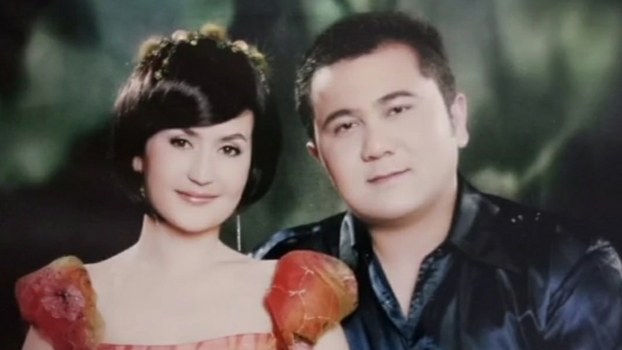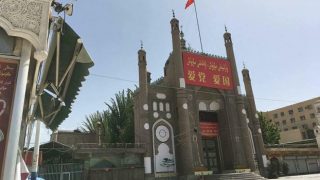
A Uyghur teacher of Mandarin Chinese, who is believed to have been detained in an internment camp in northwest China’s Xinjiang Uyghur Autonomous Region (XUAR), has died, according to his wife and officials.
In comments posted to social media in August, a woman named Muyeser said her husband Arslan had died recently, but did not provide further details.
Arslan, who was in his 30s, had lived with Muyeser and their child in Ghulja (in Chinese, Yining) city, in the XUAR’s Ili Kazakh (Yili Hasake) Autonomous Prefecture, where he taught Mandarin Chinese to Uyghur students at a primary school in the city’s Dongmele district.
Although the circumstances surrounding his death are unclear, Arslan is thought to have died in mid-August while detained in the XUAR’s vast network of internment camps, where authorities are believed to have held more than 1.5 million Uyghurs and other Muslim minorities accused of harboring “strong religious views” and “politically incorrect” since April 2017.
The internment of Uyghurs is done without legal due process and detentions are not announced by authorities, making verification of the dates and details of their disappearances from society difficult.
RFA’s Uyghur Service spoke with a representative of the Dongmele neighborhood committee who said they were unsure of which school Arslan taught at.
But a staffer with the Ghulja City Bureau of Education told RFA that Arslan taught Uyghur children Mandarin Chinese at the No. 5 Primary School in Dongmele and, when asked which security organ had overseen his burial, replied, “the Dongmele Police Department.”
The staffer, who spoke on condition of anonymity, referred further questions to the Communist party secretary of No. 5 Primary School, surnamed Li.
An officer at the Dongmele Police Department confirmed that Arslan had taught at No. 5 Primary School, but said he could not provide information about his death over the phone.
“I can’t tell you the details,” the officer said, adding that RFA should “ask the relevant higher-level bureaus” for more details.
Mass incarcerations
While Beijing initially denied the existence of the camps, China this year changed tack and began describing the facilities as “boarding schools” that provide vocational training for Uyghurs, discourage radicalization, and help protect the country from terrorism.
But reporting by RFA’s Uyghur Service and other media outlets suggest that those in the camps are detained against their will and subjected to political indoctrination, routinely face rough treatment at the hands of their overseers, and endure poor diets and unhygienic conditions in the often overcrowded facilities.
Mass incarcerations in the XUAR, as well as other policies seen to violate the rights of Uyghurs and other Muslims, have led to increasing calls by the international community to hold Beijing accountable for its actions in the region.
At the Ministerial to Advance Religious Freedom in Washington in July, U.S. Secretary of State Mike Pompeo called the internment camps in the XUAR “one of the worst human rights crises of our time” and “truly the stain of the century.”
U.S. Vice President Mike Pence also slammed the camps “where [Uyghurs] endure around-the-clock brainwashing” and survivors have described their experience as “a deliberate attempt by Beijing to strangle Uyghur culture and stamp out the Muslim faith.”
U.S. Ambassador-at-Large for International Religious Freedom Sam Brownback recently told RFA in an interview that countries around the world must speak out on the Uyghur camps, or risk emboldening China and other authoritarian regimes.
The U.S. Congress has also joined in efforts to halt the incarcerations, debating legislation that seeks accountability for China’s harsh crackdown on the Uyghurs. The Uyghur Human Rights Policy Act would appoint a special State Department coordinator on Xinjiang and require regular reports on the camps, the surveillance network, and the security threats posed by the crackdown.
Reported by Shohret Hoshur for RFA’s Uyghur Service. Translated by Alim Seytoff. Written in English by Joshua Lipes.
Source: Copyright © 1998-2016, RFA. Used with the permission of Radio Free Asia, 2025 M St. NW, Suite 300, Washington DC 20036. https://www.rfa.org.



